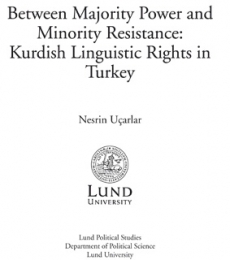| Introductory Words
It is no coincidence that ‘the return of the political’ (Mouffe 1993) accompanies the return of the ignored, degraded, oppressed and subjugated. The ‘political’ that has been returning corresponds to the struggles for re-accommodating the voices of various minorities. Members of cultures, languages, religions and sexes different from those of the majorities that dominated the public sphere have started to speak not individually but collectively, transcending the private sphere to which they had been confined. The political does not only return via the encounter of minorities with the dominant discourses in the public sphere but also through what the former says and how it speaks. In this respect, they are invited to be a part of contemporary critical theories, which suggest that ‘it is from those who have suffered the sentence of history – subjugation, domination, diaspora, displacement – that we learn our most enduring lessons for living and thinking’ (Bhabha 2001: 172). Therefore, the call for the political invites those hitherto excluded to the stage, which is no more to be inhabited only by the ‘professional’ actors. In remembering Arendt (1998), action is the human condition of plurality, which is the conditio per quam (sufficient condition) of all political life. However, this sufficient condition has been deactivated through the weakening of plurality, which has undermined the basis of the political.
The political does not simply mean unique ‘national’ interests, a qualified majority of votes, or limited parliamentary seats. Determining state territories is not only about drawing lines on a piece of land, but also about fencing the living areas and minds of people. The minority question, in fact, simply makes the fences less invisible. This visibility helps question the dominant ontological and epistemological settings that not only restrict minority rights but also constrain the contemplation of majorities. As Horkheimer emphasises, ‘how this dehumanization of thinking affects the very foundations of our civilization can be illustrated by analysis of the principle of majority, which is inseparable from the principle of democracy’ (1974: 26). The principle of majority is embedded in the principle of democracy through the idea of the nation-state. In this respect, the return of the political can be analysed by examining the principle of the nationstate, which constructs the majority in opposition to the minority. The principle of majority becomes the operating tool of the nation-state, which uses majority power to dominate minorities.
As the most figurative asset of membership in a majority or minority and the most symbolic aspect of national authority, language is a major site of struggle for majority power and minority resistance. Therefore, the question of minority rights in general and the linguistic rights of minorities in particular constitutes one of the most appropriate frameworks within which this site of struggle can be analysed through the theoretical perspectives questioning the principles of majority and minority. For the purposes of this study, which focuses on the question of Kurdish linguistic rights in Turkey, the sites of struggle for majority power and minority resistance are as follows: the documents of international and European organisations on the linguistic rights of minorities, the impact of the modernisation and nation-state building process in Turkey on the Kurdish-speaking community and the resistance engendered by the Kurdish intelligentsia in the European diaspora and in Turkey against the majority power delimiting the Kurdish linguistic rights. | 